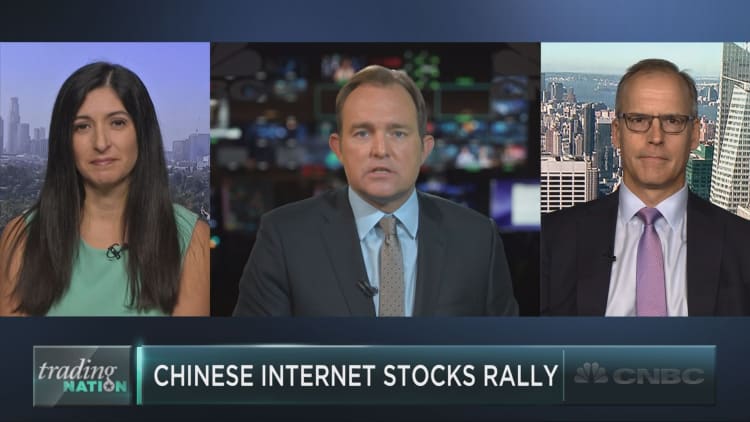
Chinese internet stocks such as Alibaba and Tencent have been hitting it out of the park this year, but experts say their rallies could be set to take a breather.
The KraneShares CSI China Internet exchange-traded fund (KWEB), one of the year's best-performing large funds of its kind, tracks Chinese tech giants such as Baidu, Alibaba and Tencent; the ETF has risen nearly 62 percent year-to-date.
On Monday the ETF dove about 4 percent, led to the downside by shares of Alibaba (down nearly 5 percent on Monday), Baidu (down over 2 percent) and Tencent (declining over 1 percent). And according to Robert Sluymer, technical strategist at Fundstrat Global Advisors, the group is largely overbought and will likely see further downside from here.
"We're starting to see a shift in the markets back to value, away from growth. So you combine the technicals of these stocks being somewhat overbought, vulnerable to a pullback; we're starting to see sloppiness in growth stocks in general, and we're starting to see value come on," Sluymer said Friday on CNBC's "Trading Nation."
More pointedly, with a recommendation for investors, he said: "I think this is not where you buy these stocks. If you're an owner of these names, maybe you can write some covered calls on them, maybe you can protect your existing positions."
While he sees some of these Chinese internet-related stocks as "core positions," this is not the juncture at which investors ought to buy.
"I think you have to wait. In fact, I'd be looking at other areas of the market, notably value, at this point," he said.
The ETF's success this year is somewhat ironically linked to the Chinese government's heavy censorship of internet use.
Names like Alibaba and Tencent offer some of the same services that Google and Amazon offer for citizens outside of the country. KraneShares, which makes the KWEB, described the product as offering exposure to "companies benefiting from the increasing domestic consumption by China's growing middle class."
"If you look at just the sheer numbers, China has 700 million internet users," Gina Sanchez, CEO of Chantico Global, said on Friday. "It's the single largest internet market in the world. And because they actively censor — they keep the Googles and the Amazons out — it basically creates this market for these companies, and they have become massive very quickly."
The growth seen in Tencent and Alibaba, which are the top-weighted names in the ETF, is "incredible," Sanchez said on "Trading Nation."
"The question is, is that sustainable? Can that last? They still have a ways to go in terms of continuing to dominate, and both of these [companies] are looking to expand out of China and into India, into the U.S. So yes, you could actually see this as a platform for a larger expansion. However, after something has gone up this fast, you do have to take a breather," she added.
One thing investors might want to note about the KWEB is its high fee. It charges a total annual fund operating expense of 0.72 percent, per the KraneShares website. That compares to 0.2 percent for the popular PowerShares Nasdaq 100-tracking ETF (QQQ) or 0.1 percent for the Vanguard Information Technology ETF (VGT).





